
Chennai’s enduring love for vegetables and fruits is well-known. Though we love handpicking fresh produce, the city has gracefully embraced the shift toward online purchase in recent years. Madras Mandi has been harnessing this potential since 2020. Beyond delivering quality, the venture also seeks to reduce wastage in the fresh produce supply chain making the venture more impactful.
A collective effort of Prashanth Vasan, Siddharth Raveendaran and Vikram R., Madras Mandi’s objectives have been straightforward — delivering freshly harvested produce within 12 hours, establishing a profitable ecosystem for local farmers, and minimising supply chain wastage. What distinguishes them from other players, according to Prashanth Vasan, CEO of Madras Mandi, is their unwavering commitment to their values. “In the Chennai market, achieving the right balance in quality, pricing, experience, and delivery time is crucial. We don’t see ourselves in direct competition Cultivating with mainstream players,” he explains.
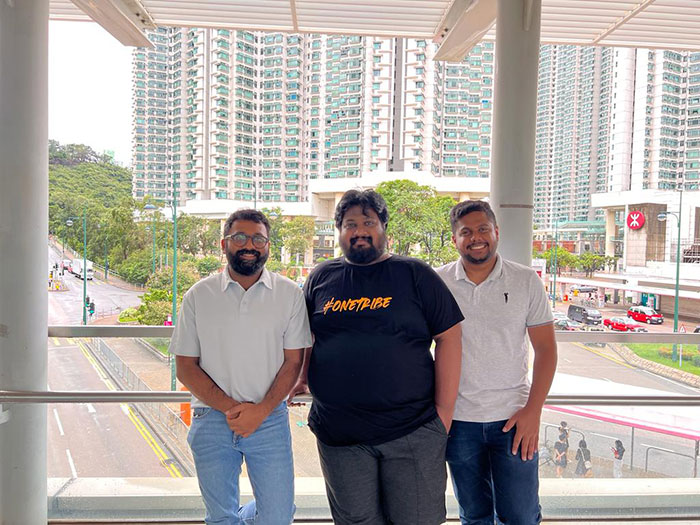
Cultivating change
At the core of this entrepreneurial venture is a dedication to delivering farm-fresh goodness directly to the homes of every Chennai resident. What initially began as a mobile application has expanded into the establishment of seven physical stores within the city, with three more scheduled to open in Mogappair, Ramapuram, and Besant Nagar.
Their approach involves studying the market in each area and tailoring the selection of fruits and vegetables accordingly. Prashanth elaborates, “What may be popular in Neelankarai might not have the same demand in Choolaimedu. However, we ensure the touch-and-feel experience is consistently met.”
Technology plays a pivotal role, with sales evenly divided between the mobile app and physical stores. Prashanth notes, “Majority of our customer base falls within the middle-aged demographic, with 70 to 80% being women. Interestingly, men tend to shop more, often deviating from the list while women stick to it,” he chuckles. As awareness grows, the demand for exotic vegetables like broccoli, zucchini, lettuce, and asparagus has seen a sustained increase and is expected to persist, according to his assertion.
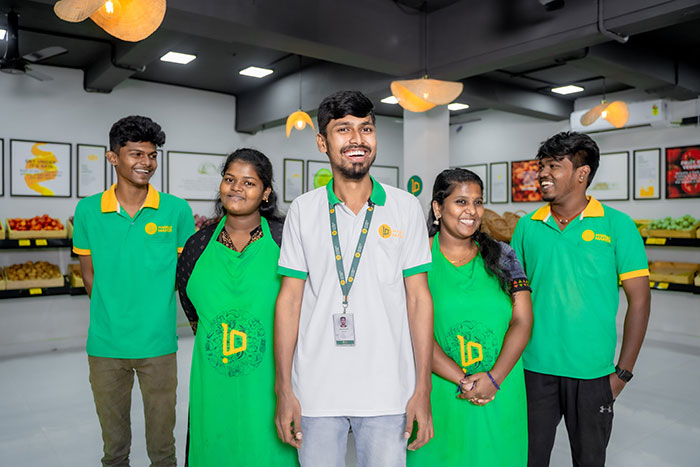
Delivering an impact
Alongside customers, farmers have been the bedrock for Madras Mandi. Over the last three years, the venture has established a profitable ecosystem for over 5,000 local farmers. Remarkably, it has successfully decreased supply chain wastage from 35% to less than 5%.
“Drawing from decades of experience, our parent company — Shri Annamalai Agro Products Pvt Ltd — had already forged strong bonds with farmers. We value this long-standing relationship. Madras Mandi is only a seamless integration of technology into our existing network,” notes Prashanth.
Madras Mandi assures purchase of the entire lot from farmers, eliminating the need for them to navigate markets to sell their produce and grade the supply by themselves. “This has ultimately reduced a lot of anxiety and provided farmers with a reliable and convenient solution. It’s this commitment that keeps our partnerships strong and enduring,” he affirms.
True to its ethos, the platform contributes to fair trade practices by ensuring fair prices for farmers and providing affordable prices for customers.
“We provide tools and practical know-how to farmers, empowering them with the knowledge and skills needed to enhance their agricultural practices. These educational efforts have proven to be effective, contributing to the overall well-being and sustainability of the farming communities we work with,” he adds.
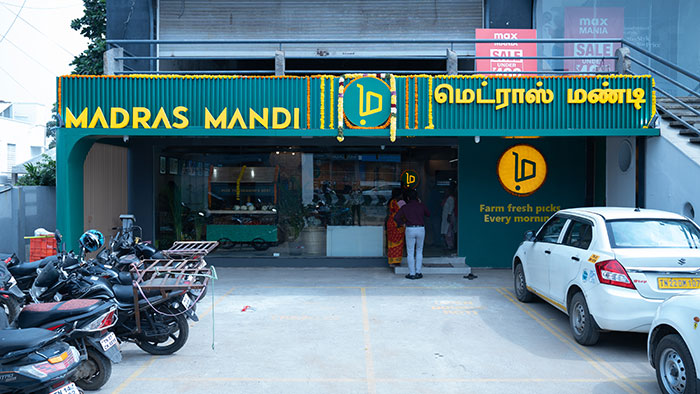
Of community and collaborations
The success of the venture is also rooted in encouraging vibrant community engagement on social media. Prashanth elaborates, “Through the creation of educational content on new varieties, recipes, and proper storage techniques, we’ve cultivated a community that is more inclined to experiment with diverse fruits and vegetables. It’s truly gratifying to witness our community not only eating but also adopting healthier choices and deriving joy from the cooking process.”
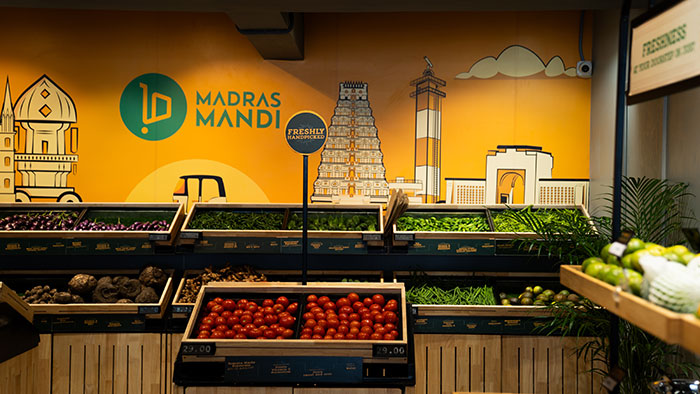
One such fruitful collaboration with Vizha, for Kootanchoru, an event to celebrate their third anniversary garnered appreciation from the clientele. “For Kootanchoru, we crafted a simple yet impactful menu that showcased how fresh ingredients could be elevated with different cooking techniques. Throughout the event, we took moments between courses to provide insights into the food — how it was prepared and the fresh ingredients used. It was more than just a meal; it was an opportunity to encourage our guests to be mindful of their food choices and be present in the moment,” explains Prashanth. With another collaboration on the horizon, Prashanth affirms that this is set to become a recurring initiative.
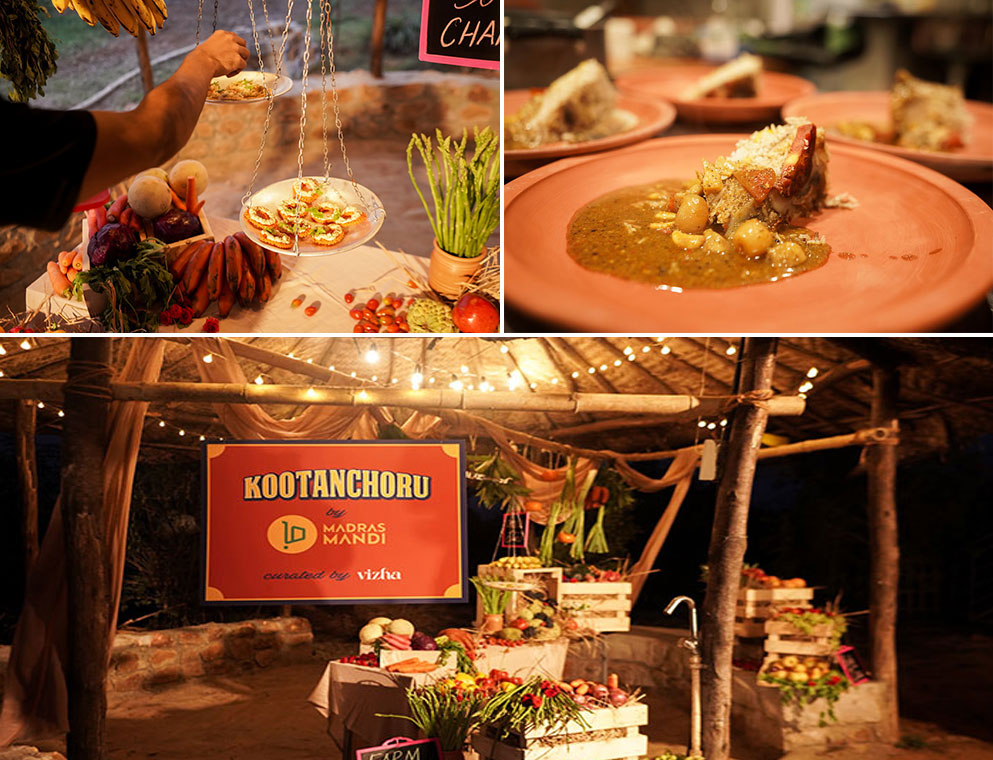
Healthy practices
Sustainability is ingrained in Madras Mandi’s operations, with less than 5% wastage, reusable packaging, and a tech-enabled forecasting system to minimise environmental impact.
Madras Mandi delivers in reusable crates, paper bags and banana leaves for packaging requirements as much as possible. “At the store level, we provide customers with paper or cloth bags with their produce as well. When it comes to deliveries, we’re focused on minimising our environmental footprint,” adds Prashanth.

Lastly, their tech-enabled forecasting system allows them to predict the amount and variety of fresh produce required. This puts an end to issues such as overproduction or running out -– it’s all about efficiency and reducing unnecessary waste.
So how does Madras Mandi stay abreast with the latest trends in the market? “Our partners are deeply embedded in the southern agriculture landscape for decades. This rich experience provides valuable insights into market trends, harvest patterns, and potential consumer demands, enabling us to make informed predictions and forecasts,” says Prashant.
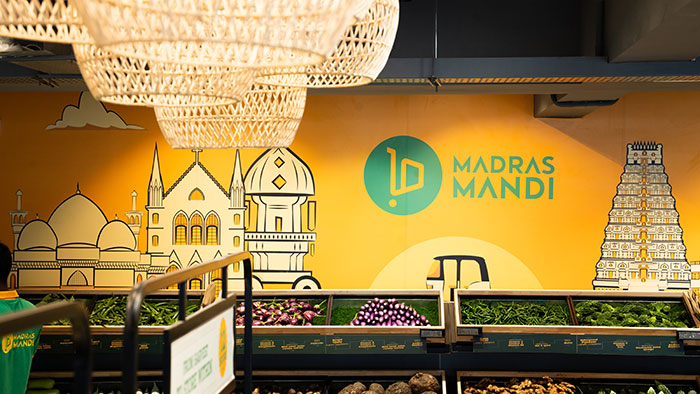
Harvesting hope
The journey of Madras Mandi serves as a beacon for those looking to make a positive impact in the agriculture and e-commerce sectors.
Prashanth’s advice to aspiring entrepreneurs is to thoroughly research the market, embrace the iterative process, and stay attuned to customer feedback. “This involves gaining a deep understanding of the product, identifying your target audience, and grasping the cultural nuances of the specific market you’re targeting,” he suggests.
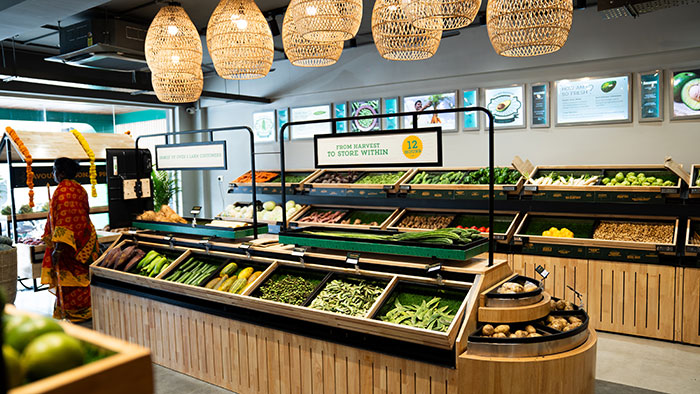
As the venture embarks on another year with renewed determination, Prashanth and the team persist in their efforts. He asserts, “The term ‘farmer’ is frequently misused in the industry for reasons that aren’t entirely accurate. It’s essential to rectify that perception. Simultaneously, many consumers lack awareness of what constitutes a truly fresh product. Our generation needs to cultivate greater awareness, and we are actively working towards this goal.”





